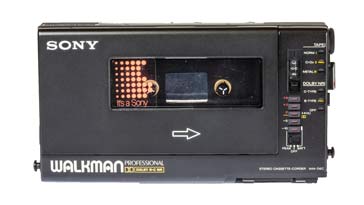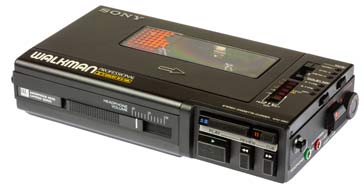Sony WM-D6C Professional Walkman
The Sony WM-D6C was introduced in 1985 as a Walkman for professional applications - it was so popular amongst audio enthusiasts and professionals that it was not discontinued until 2003.
Sony Walkman History Includes:
Sony Walkman
WM-D6C Professional
WM-EX150
See also:
Sony Walkman
Apple iPod
Sony introduced a very wide range of Walkmans from the ones aimed at those wanting to listen to music on the go to the WM-D6C which was a high end portable recorder for professional use.
The superior recording and playback quality of the Sony WM-D6C along with its portability meant that it was used by very many people where high quality recording and playback were needed.
It was used in a variety of applications, including collecting audio for radio broadcasting.
WM-D6C details and specifications
The Sony WM-D6C boasted a high specification for an analogue cassette recorder. Some of its details are tabulated below.

| Sony WM-D6C Professional Walkman |
|
|---|---|
| Parameter | Details |
| Overview | Professional recorder and player intended for a variety of applications including recording for broadcast, etc. |
| Year of introduction | 1985 |
| Tape types | Type I, CrO2, Metal |
| Noise reduction schemes | None; Dolby B, Dolby C |
| Output | 30 mW into headphones and 0.25 line |
| Power | 4 x AA or 6V DC supply in |
| Dimensions | 181 x 40 x 95mm |
| Weight | 640g |
WM-D6C overview
Sony launched the WM-D6 designed this machine to be a really top end portable cassette recorder, and many reviews place it above most high end fixed cassette players. It even ranks higher than many of the established tape recorders if the reviews are to be believed.
The transport features a servo-controlled iron-less core motor which drives the actual transport via a crossed belt. There is a precision brass flywheel to keep the speed stable. If this was not enough it was, aided by a smaller but faster rotating flywheel turning in the opposite direction to cancel the inertial effects of the machine being carried.

Other features of the transport mechanism include an automatic stop in playback mode and an fast forward/rewind arrangement which provides a cue and review capability.
In terms of the electronics, the machine has line in and out to connect it to a mixer, hi-fi system or the like. Also the noise reduction included Dolby C on top of the Dolby B with a switch to select noise reduction off, or either of the two Dolby schemes.
The machine also had switch positions for standard, CrO2 and metal tapes.
The record payback head was also particularly fine - it used the quality Sony "S&F" Sendust and Ferrite head which made it Metal tape compatible. The head had an amorphous core, using this material gave the head excellent magnetic performance.
The WM-D6C continued production until 2003 although the circuit board was redesigned to move from the older leaded components to surface mount to enable more cost effective manufacture.
Many people continued to use the WM-D6C Walkman for many professional applications as it provided reliable and high performance operation as well as providing many of the features needed.
In view of its performance and popularity and performance, the WM-D6C still commands a good proice on the second hand market where it is eagerly sought after.
 Written by Ian Poole .
Written by Ian Poole .
Experienced electronics engineer and author.
More History:
Radio history timeline
History of the radio
Ham radio history
Coherer
Crystal radio
Magnetic detector
Spark transmitter
Morse telegraph
Valve / tube history
PN junction diode invention
Transistor
Integrated circuit
Quartz crystals
Classic radios
Mobile telecoms history
Vintage mobile phones
Return to History menu . . .



